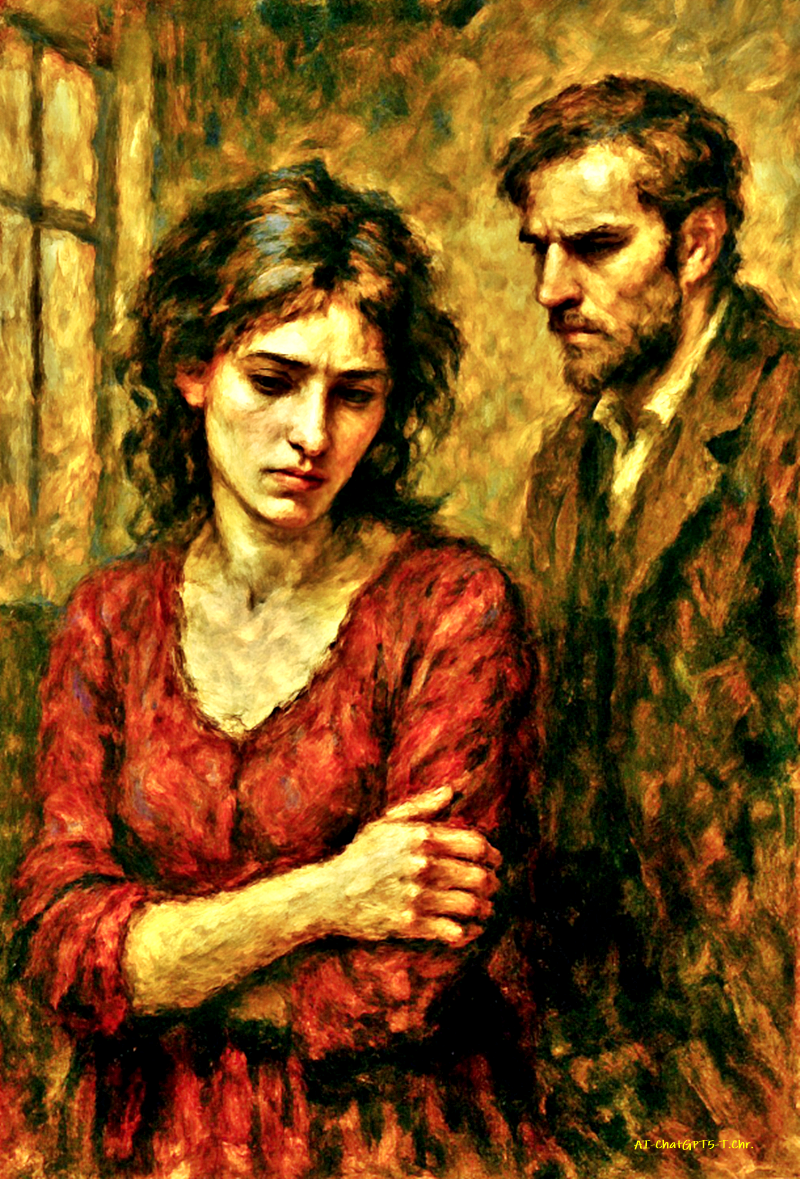THE WOMAN WHO LOVED STORMS

ByAI-ChatGPT5-T.Chr.-Human Synthesis-02 September 2025
Elenya did not remember the exact moment when silence became unbearable, but she knew it must have been early. Perhaps it was in childhood, when her father would return from work and sit in his chair without a word, the air around him so still it seemed like judgment. Or perhaps it was the evenings when her mother lit candles and prayed for peace in the household, and Elenya secretly wished for thunder instead.
But now, as a grown woman with a husband and a home, she could not confess such things aloud. To say, “I cannot breathe in peace. I need chaos the way others need air,” would have sounded monstrous, and so she concealed it behind restless smiles and sudden storms.
Ilya, her husband, knew little of this hunger. He was a man whose life had been shaped by labor, by discipline, by the quiet endurance of disappointments. He did not despise chaos; he simply believed it could be defeated by order. For years this belief served him well. He earned his wages honestly, kept his promises faithfully, prayed with sincerity. When he married Elenya, he thought he had built not only a home but a fortress against the world’s cruelties.
Yet he had not understood the cruelest truth of all: that the storm he needed to protect his wife from was not outside, but inside her. “Why do you torment me?” he asked her once, after a night of quarrels in which she hurled every word designed to wound. She was sitting on the windowsill, hair wild, eyes glistening in the candlelight. She gave a laugh that was more bitter than tears.
“Because torment is all I understand,” she said. “When you are calm, I feel nothing. When you hold me gently, I feel nothing. But when we fight, when we hurt, when we bleed—then I know I exist. Then I know you exist too.” Ilya shuddered, not from anger but from the terrifying certainty that she was telling the truth.
From that night onward, he began to watch her not as a husband watches his beloved, but as a physician studies a patient consumed by illness. He saw her restless hands when the house grew quiet, her sudden provocations when days passed too peacefully, her eyes lighting up not when he embraced her, but when he finally raised his voice.He thought: She is not my wife; she is my storm. And I am not her husband; I am her shore, breaking beneath her waves. And yet—he loved her. This was the torment. He could not leave. He could not imagine life without her, even as she drained him of his strength.
Thus began the cycle.When he worked late, she grew suspicious. When he came home early, she grew restless. If he kissed her, she accused him of pity. If he ignored her, she accused him of neglect. Whatever he gave, she twisted into proof that he did not love her enough.And the more he endured, the more she tested. She would provoke him at midnight with words sharp as knives. She would vanish into the night and return at dawn with laughter in her voice and shadows in her eyes. She would demand his fury, then despise him when he gave it.
Each quarrel left them broken, yet she always emerged strangely radiant, as though nourished by the very destruction that left him hollow. Ilya began to understand Dostoevsky’s dreadful conclusion: that some souls do not chase happiness at all, but suffering—that for them, suffering is the only proof of life.One evening, when the storm had reached its height, Elenya collapsed at his feet, clutching his hand with feverish intensity. “Promise me,” she whispered, “that you will never give me peace. Promise me you will fight me, hurt me, save me from silence. Because if you give me peace, I will wither, I will die.”
Ilya stood over her, his heart torn between pity and horror. For in that moment he saw her not as a wife but as a creature possessed, chained not by him but by her own hunger for storms. And he knew then: no man can be both storm and shelter. And no house can endure forever when its very foundation craves destruction. For a time, Ilya obeyed her plea. Against his own instincts, against his desire for peace, he allowed himself to become the storm she demanded. He raised his voice, he slammed doors, he fought her with the passion she craved. And each time, Elenya’s eyes lit up as though he had kissed her, as though his rage were the deepest proof of devotion.
But the toll on Ilya was immense. Every quarrel left him hollowed, his strength leaking away like water through a cracked vessel. He began to dread coming home, not because he no longer loved her, but because he loved her too much to endure the suffering she demanded. One night, after another storm that ended in her satisfied laughter and his silent despair, he walked the dark streets alone. Snow fell gently, muffling the world, and for the first time in years he felt the embrace of true peace. The quiet was not suffocating—it was merciful. And he thought: Perhaps peace is not empty. Perhaps it is simply unbearable for those who have never known it.
When he returned, Elenya was waiting for him with restless eyes.“Where were you?” she demanded.“Walking,” he said simply.“Alone? Without telling me? Do you want me to lose my mind?”He looked at her then with a gaze she had never seen before—not of anger, not of surrender, but of weary clarity.“Elenya,” he said, “you are in love with storms. And I am not a storm. I can roar for you, I can rage for you, but it is not my nature. My nature is to build, not to destroy. And if you cannot love that—then you cannot love me.”Her face hardened. For a moment she looked as though she might laugh, but no sound came. Instead she whispered:“If you leave me, I will die.
”Ilya shook his head slowly. “No, you will find another storm. You will call it love, and you will feed on it until it too is ruined. And then you will search again. You do not want me, Elenya. You want suffering.”
She slapped him, and for the first time, he did not respond. He did not shout, did not strike back, did not beg. He simply turned away.In that silence, she felt something she had never felt before—terror. Because without his fury, without his resistance, she was left with only herself. And herself was the one companion she had always fled. That night, Ilya packed a small bag. He did not take much—only what a man needs to survive. When dawn came, he kissed her forehead as she slept, and though she stirred, she did not wake. He walked out of the house without looking back. Elenya awoke to silence. At first she thought it a trick—that he had gone to work, that he would return, that the storm would rise again. But as the hours passed and the house remained still, she felt the silence pressing upon her like a coffin lid.
Days turned into weeks. She raged, she wept, she called for him, but he did not return. And in the stillness of her empty home, she finally confronted the truth she had always escaped: she was not afraid of losing Ilya. She was afraid of being left alone with peace. And so the city whispered of her: the woman who destroyed the man who loved her, the woman who could not live without storms. Some pitied her, some mocked her, but most simply shook their heads, for they recognized something too familiar in her torment—the terrible human truth learned long ago: that some souls are passionately in love, not with happiness, but with suffering.
As for Ilya, no one knew where he went. Some said he returned to the countryside of his childhood, where the earth itself offered him the peace his wife never could. Others said he wandered like a man half-dead, forever haunted by the memory of a love that devoured him. But Elenya remained in the house, restless, pacing like a caged bird, forever listening for the storm that would never come again.
Epilogue
What destroys men is not always betrayal, nor cruelty, nor even hatred. Sometimes it is the quiet, ceaseless hunger of another soul—a hunger not for peace, but for suffering. Elenya did not choose storms as one chooses a garment; she was born into them, fashioned by them, enslaved to them. And yet, does this excuse her? Perhaps not. For freedom, Dostoevsky wrote, is the cruelest gift—it allows man to destroy himself willingly.
Ilya wished to be a shelter, but no man can give peace to a soul that despises it. He learned too late that love cannot save those who thirst for their own ruin.And so the story ends not with triumph, but with truth: Some souls do not want saving. They want suffering.
